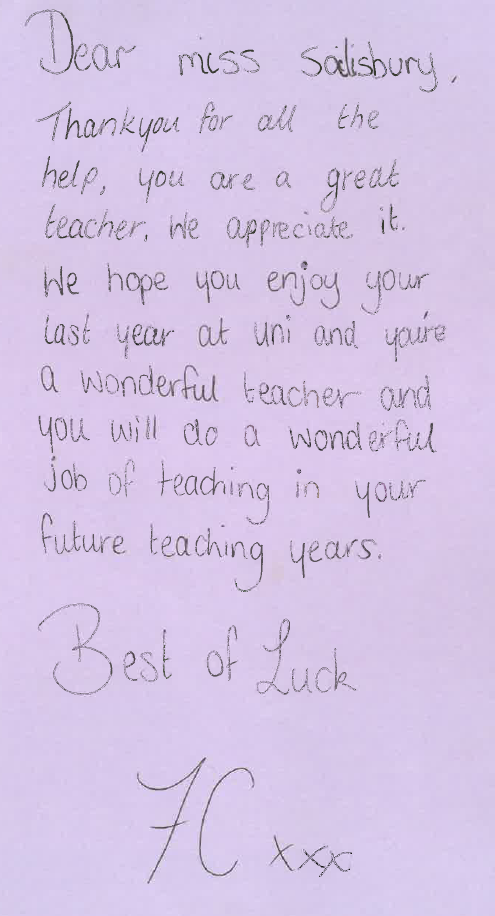My teaching philosophy is based on what Mills called liberal education. A liberal education focuses on the pursuit of truth and believes that all knowledge is valuable and therefore worth knowing (Marples, 2010). This value is at the heart of my teaching philosophy. I believe that as educators we are creating the citizens of the future and therefore we are in a position of privilege and responsibility.
I believe in the value of education for the development of informed ethical citizens, who in turn, highly prize their own education. The Melbourne Declaration states that education is for the development of active and informed citizens who can make decisions relating to their own life (Barr, Gillard, Firth, Scrymgour, Welford, Lomax-Smith and Constable, 2008). Through my specialty subject areas of Mathematics and Science, there is an amazing opportunity to create questioning individuals, forming opinions based on data and evidence rather than merely taking on the views of others (Sampson, Grooms & Walker, 2011). During my Science teaching I focus on inquiry and argumentation, building curiosity within my students and encouraging them to reason. The use of inquiry and argumentation within schools is a highly effective way of encouraging critical thinking which is a life skill students need to develop to be a contributing member of society (Osborne, 2010).
One aspect I prioritise in my teaching is developing respectful relationships with my students and there is a strong correlation between a positive relationship and the education of a student (Rogers, 2015). I try to get to know all my students and learning something about their lives. During my professional experiences I have been commended for my ability to learn names quickly and to engage is conversation with my students, finding out their interests. An activity I ran included the students telling me about themselves through pictures. From this experience I received feedback from my students on my ability to get to know them. Only by taking the time to build this relationship can the teacher create a positive and fulfilling learning environment.

Thankyou card made by year 7 students from professional placement
I believe in the value of education and the need to be a life-long learner. I have enthusiasm for my specialty subject and acquiring new knowledge in general. An enthusiasm for learning is essential for all teachers to be able to encourage students to share that enthusiasm (Kunter, Tsai, Klusmann, Brunner, Krauss and Baumert, 2008). As teachers we have an ethical responsibility to believe that what we teach is worth learning and I believe that we can’t expect students to value education if we do not value it ourselves (Moltow, 2016). My teaching focuses on developing knowledge in mathematics and science and even though some students may not pursue a career in these areas, they are still able to participate in the discourse of these areas for enjoyment and to equip them to make informed decisions relating to their own lives.
My teaching philosophy aims to create enlightened individuals that lead a flourishing existence rather than just surviving (Plato, 1955).
Barr, A., Gillard, J., Firth, V., Scrymgour, M., Welford, R., Lomax-Smith, J., & Constable, E. (2008).Melbourne Declaration on Educational Goals for Young Australians. Ministerial Council on Education, Employment, Training and Youth Affairs. PO Box 202 Carlton South Victoria, 3053, Australia.
Kunter, M., Tsai, Y. M., Klusmann, U., Brunner, M., Krauss, S., & Baumert, J. (2008). Students' and mathematics teachers' perceptions of teacher enthusiasm and instruction.. Learning and Instruction, 18 (5), 468-482.
Marples, R. (2010). What is Education for?. In R. Bailey (Ed).The Philosophy of Education: An Introduction (pp35-46). Bloomsbury Publishing
Moltow, D., (2016). Ethics, Education and Professional Practice, Lecture Series Four. University of Tasmania.
Osborne, J. (2010). Arguing to learn in science: The role of collaborative, critical discourse. Science, 328 (5977), 463-466.
Plato. (1955). The Republic (Penguin Classics). (D. Lee, Trans.). London, England: Putnam Books. (Original work written 360 BCE).
Rogers, B. (2015). Classroom Behaviour: A Practical Guide to Effective Teaching.Sage Publications Limited, London.
Sampson, V., Grooms, J., & Walker, J. P. (2011). Argument‐Driven Inquiry as a way to help students learn how to participate in scientific argumentation and craft written arguments: An exploratory study. Science Education, 95(2), 217-257.